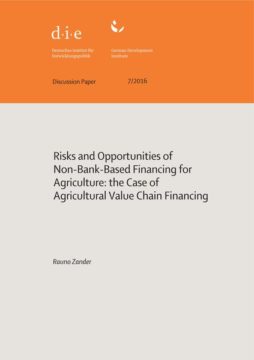For several years, development agencies and their partners have been involved in programmes supporting non-bank-based forms of financing for the agricultural sector. This is because non-bank-based forms of financing appear to have the potential to ease financing constraints on the private sector. An example is agricultural value chain financing. However, it is not clear what the risks and opportunities of non-bank-based forms of agricultural financing are for the development and stability of the financial sector as well as for the development of agricultural sectors. This study seeks to contribute to filling this research gap by examining the risks and opportunities of agricultural value chain financing for agricultural sector development and financial development. Based on a review of the literature on value chain financing, on the analysis of practical experiences with value chain financing, and on interviews with experts, the study identifies some of the major advantages and disadvantages of non-bank-based value chain financing and of measures policymakers have to limit potential risks, such as a lack of consumer protection. Addressing such risks is important because, as the study shows, non-bank financing of agricultural value chains is unlikely to be fully substituted by formal financial institutions. Even as financial sectors develop and reach higher levels of sophistication, there will always be market niches for non-formal financial intermediaries where loan requests are too specialized, too small or required too quickly to be serviced by a commercial bank.
- Veröffentlicht am Dienstag 16. Februar 2016 von Deutsches Institut f. Entwicklungspolitik
- ISBN: 9783889856852
- 48 Seiten
- Genre: Gesellschaft, Politik, Sachbücher, Volkswirtschaft, Wirtschaft
